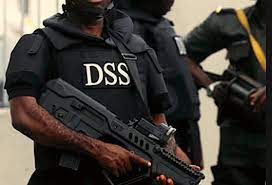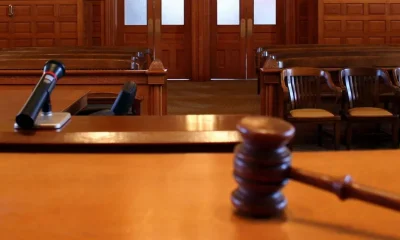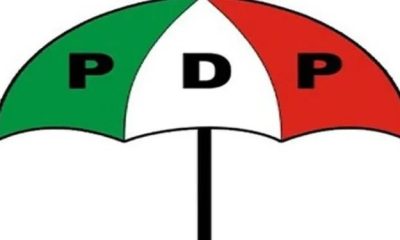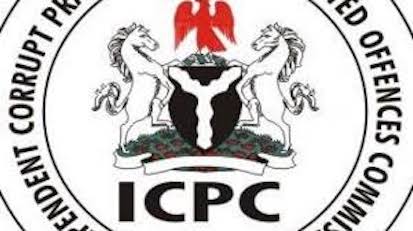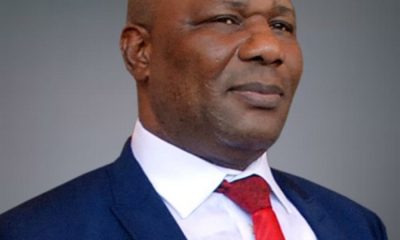OPINION
The DSS Operates Within its Mandate

By Dr. Peter Afunanya
Recently, about five major newspapers called out the DSS for bashing of sorts. The papers, which used their platforms to express varied views about the modus operandi of the Service include Vanguard, Daily Trust, The Sun, Tribune and Punch.
While Vanguard’s piece on 2nd June 2023 was Dousing the DSS/EFCC Feud, Daily Trust, on 6th June 2023, published an editorial titled The DSS Must Conduct Its Duties as a Secret Service.The Sun, on 7th June, published The Needless DSS/EFCC Fracas while Tribune on 8th June 2023 wrote on The EFCC/DSS Confrontation. Similarly, on 14th June 2023, Punch featured DSS, Others Need Radical Reforms.
It did not seem that the editorials which sought the reforms of the DSS or to criticise it for its public statements or actions on various subject matters of national security concern were, by any means, an accident or a coincidence.
It looked every inch planted or organised. It is a hatchet job or so it seemed.The judgement that the Service is excessively public or ubiquitous missed the point. The papers manifested predictable bias and patterns.
Relatedly, some respected legal personalities namely, Olisa Agbakoba SAN, Mike Ozekhome SAN and Femi Falana SAN opined that the Service operates outside its mandate especially with regards to the investigation of Godwin Emefiele. The fact that this matter has become sub-judice constrains the Service from making further statements about it.
The celebration of the news of a court order to allow his Lawyers and family access to him is quite unnecessary. He was never denied access. Ever since he was taken into custody, his family has continually accessed him. Same with medical officials. The impression that the Service is going to act on the prompting of the Court is not correct. This is by the way.
Back to the subject under discourse. While it may be fair to admit that the news media and aforementioned personalities are entitled to their opinions, measured ignorance predominantly played out in their arguments. First, they failed to recognise that security threats are evolving and so do the approaches to managing them. Instructively, the security landscape in Nigeria, like many other countries, has become increasingly complex and dynamic.
The periodic issuance of press statements to educate or carry citizens and residents along has undoubtedly become part of strategies to manage national security challenges. Extensive research would have revealed to the critics that the Central Intelligence Agency (CIA), Federal Bureau of Investigation (FBI) and other world intelligence Services deploy similar tactics including occasional statements and advisories.
The CIA includes demographic information on its website to provide the public with valuable insights and data about various populations so to enhance understanding of different regions and communities. Does it mean CIA is operating outside its mandate? Or will that be accepted because it’s CIA, a foreign body?
The need for the agencies to be responsive, transparent and apprise taxpayers has become the global norm in national security and intelligence management. It is called security/intelligence accountability. The tenets of security and intelligence governance expect that agencies remain transparent, accountable and compliant to democracy. World over, Intelligence Services operate in ways and means not too discernable to the uninitiate. But the institutionalisation of democracy as preferred political culture has nonetheless forced such agencies to communicate often with the Public. You can see why the public statements can never be out of place.
Without public consciousness and support, countering threats may remain a herculean task for security agencies. Democratic subordination and legislative oversight are basic principles which make it an obligation for these agencies to operate openly even when some of their activities are secret. Ask the USA, UK, France, Canada and other advanced democracies. This level of openness does not vitiate the expected secrecy or in any way compromise their operations.
Regarding the matter concerning the DSS and EFCC, both agencies have refuted claims of a rivalry. It is important to note that comparing the 30th May, 2023 incident at 15 Awolowo Road, Lagos to the barricade of National Assembly in 2018 is inaccurate and unjust due to the substantial differences in the nature and context of the two events. While it is essential to emphasize inter-agency relations and cooperation, it would be unfair to generalise and imply that the Service is in rivalry and power struggle with the Commission. Each agency operates within its distinct mandate and context.
Meanwhile, the editorials accurately alluded to the constitutionality of the DSS as an intelligence organisation in detecting, preventing and neutralising threats against Nigeria. They commended the Service for its commitment to the security of the country as well as the many feats it had accomplished in the course of discharging its duties. Thank you indeed. It has to be understood that the Service is not only an intelligence organisation. It is also a law enforcement agency. It is a security and policy advisory organ. Its establishment law expects it to prevent.
To prevent unarguably means to enforce. Should the Service seek media endorsement or permission before deploying operatives and equipment to conduct its job? Should it rather play to the gallery? Characteristic of intelligence operating systems, DSS’ activities may never be completely explained or understood particularly to those who do not need to know.
Even though some of its high officials and operations are known and their veils of secrecy uncovered, there are thousand undercover personnel and actions that have no business going public. It is expected to remain so. With its broad mandate and legal authority to investigate crimes of national security significance, the DSS is well within its rights to initiate an inquiry into any relevant matter. The DSS is primarily charged to detect and prevent crimes and threats against the internal security of Nigeria.
More profoundly, it is to undertake such other responsibility as maybe assigned to it by the President and Commander-in-Chief. Appreciating this role of the DSS is instructive for some sections of the media, lawyers and other interested parties. The Service operates on the basis of rule of law. Its operations are rule governed. As required, it obtains arrest and detention warrants when and if needed. For the fact that such instruments are not advertised does not suggest otherwise.
Critics should get conversant with the law and rules of engagement and desist from misinforming, misleading or inciting the public. Those seeking to weaken the Service through premeditated reforms may be on a wild goose chase. Consistent attack on it based on ignorance, unrealised interests and emotional assessments and judgements does the country no good. The DSS has stood so firmly for Nigeria. It will continue to.
Considering the warped mentality that has triggered these writeups, it will, no doubt, be unsurprising to witness an upsurge in malicious articles, criticisms and baseless attacks in the public space following the investigations of Messrs Godwin Emefiele and Abdulrasheed Bawa among other flimsy matters. Certain groups and people are bound to come up with frivolous allegations against the Service and its leadership.
These entities may also exploit unpatriotic members of the Service to spread falsehoods, propaganda and hate in order to project the Organisation in a bad light. Given their reach and war chest to mobilise forces against Government and its key officials, the adversaries may intend to cause distractions to the on-going investigations as directed by the C-in-C. However, the Service will not depose its professionalism for cheap backlash nor discharge its duty with prejudice or fear.
For those who canvass the opinion that the DSS has no business in investigating the matters referred to it are obviously not taking seriously the omnibus powers of the President, as enshrined in the enabling Acts of the SSS and the NSA. As argued by a onetime Director of the DSS, Fubara Duke, “When a law confers on the President power to delegate ANY assignments he deems fit for a particular Agency to perform, I wonder how it falls outside the purview of (ANY) the stipulations of the President’s powers and by extension why the DSS is being faulted for carrying out the President’s directive”. Continuing, he added: “I have heard arguments of cases being thrown out by the courts over questionable prosecutorial powers of the DSS regarding some categories of cases including criminal cases.
Without prejudice to the wisdom of the court on such judgements, they should not override the lawful investigative authority of the DSS. Should there be need for prosecution in due course, these determinations would be appropriately evaluated and where/if necessary, appropriate prosecutorial agencies which may include the Attorney General’s Office or other sister agencies may be deployed to prosecute. It is not the first time this has happened”.
Let it be clear, however, that the DSS will remain unshaken and professional in carrying out its duties. It recommits to diligently operate, as always, within the confines of the law and to uphold the fundamental rights of all Nigerians. The media must, as the fifth estate of the realm, remain balanced, accurate, impartial and accountable. To sustain a deliberate misguidance of the public with any form of misconceptions is detrimental to nationhood. Therefore, to deepen the expected contributions, seeking veracity is not only ethical but obligatory. That should not be asking for too much.
Dr. Peter Afunanya, fsi, Public Relations Officer Department of State Services
OPINION
Nigeria’s Security: Between Self-defence and Community Policing

By Mukhtar Ya’u Madobi
As Nigeria continues to battle worsening security challenges — ranging from banditry and kidnapping to terrorism, insurgency, and communal violence — citizens across the country are increasingly embracing grassroots security measures and calls for self-defence.
These challenges are not confined to the North. In the South, militancy, piracy, secessionist agitations, cultism, and cybercrimes further complicate the nation’s fragile security landscape. Speaking at the maiden annual lecture of the National Association of the Institute for Security Studies, themed “Mobilising Stakeholders to Curb Insecurity in Nigeria: A Practical Approach,” the Director-General of the State Security Service (SSS), Oluwatosin Ajayi, stressed the need for communities to take greater responsibility for their own security. He cited examples where local populations had historically repelled insurgents and urged communities to work closely with security agencies to counter threats such as terrorism, banditry, and kidnapping.Ajayi noted that it is unrealistic to expect security agencies to protect every citizen across Nigeria’s expansive territory. He argued that communities must serve as the first line of defence, and that empowering them would enhance grassroots resilience, while reducing over-reliance on federal forces.Echoing this position, former Chief of Defence Staff, General TY Danjuma (rtd), recently renewed his longstanding call for Nigerians to rise in self-defence against non-state actors. Reacting to fresh waves of violence in Plateau, Benue, and other states, Danjuma insisted that citizens can no longer afford to remain passive while bandits and terrorists wreak havoc.“The warning I gave years ago remains valid. Nigerians must rise and defend themselves. The government alone cannot protect us,” he said.This message of self-defence has increasingly resonated across vulnerable communities, reflecting the harsh reality of an overstretched security system that leaves millions exposed. The roots of the crisis lie in decades of state neglect, porous borders, weak intelligence systems, and economic exclusion.In the North-West, states such as Zamfara, Katsina, and Kaduna are under the siege of bandits, who raid villages, rustle livestock, extort ransoms, and impose levies. In the North-Central region, particularly Plateau and Benue states, farmer-herder conflicts have morphed into sustained ethno-religious violence. The South-East contends with secessionist violence linked to IPOB/ESN elements, who often target security infrastructure. Meanwhile, the South-West and South-South struggle with cultism, ritual killings, and piracy.One chilling episode was the abduction of more than 280 schoolchildren in Kuriga, Kaduna State, in March 2024. Although the children were eventually rescued, the incident laid bare the glaring weaknesses in Nigeria’s security infrastructure and left the community traumatised.Faced with these realities, several states have begun taking their destinies into their hands. In April, the Kano State Government passed the Security Neighbourhood Watch Law to create a legal framework for community-led security efforts. Katsina has trained local vigilantes through its Community Watch Corps, while in Zamfara, Governor Dauda Lawal launched the Community Protection Guards (CPG), a controversial but welcomed initiative in rural areas long neglected by formal forces.In the North-East, the Civilian Joint Task Force (CJTF) continues to support military efforts against Boko Haram, leveraging local knowledge and swift response capabilities. The Amotekun Corps in the South-West, headquartered in Ondo State, has addressed critical security gaps in the region, earning both criticism and praise. Similarly, the South-East’s Ebube Agu and joint regional outfits in the South-South emerged from the growing public distrust in the federal government’s ability to guarantee safety.However, the growing wave of self-defence and vigilante initiatives raises ethical, legal, and practical concerns. Nigeria’s Firearms Act prohibits civilians from bearing arms without a licence. Without a clear regulatory framework, arming civilians risks escalating violence, enabling political thuggery, and creating new security threats under the guise of protection.These dangers are not hypothetical. In Edo State’s Uromi community, vigilantes wrongfully accused 16 Northern hunters of being kidnappers and burnt them alive. In July 2022, Ebube Agu operatives reportedly killed 14 unarmed wedding guests in Otulu, Imo State. Other vigilante groups in the region have been implicated in extrajudicial killings and abuses. A Daily Trust investigation in April revealed that vigilante groups killed at least 68 people in three months, with many more subjected to torture, harassment, or unlawful detention.These developments have prompted the House of Representatives Committee on Army to call for the regulation, oversight, and training of vigilante groups. The Uromi killings, in particular, triggered national outrage and renewed demands for accountability.Responding to these concerns, Major General Chris Olukolade (rtd), chairman of the Centre for Crisis Communication, acknowledged General Danjuma’s fears but cautioned against unregulated civilian self-defence. He warned that unless communities are engaged within a structured and legal framework, insecurity may only worsen. According to him, civilians should not be armed unless integrated into formal security systems with clear guidelines.Against this backdrop, community policing has emerged as a more sustainable and coordinated alternative. Under the leadership of the Inspector General of Police, pilot schemes have been launched across several states. These involve recruiting and training locals for surveillance, intelligence gathering, and early intervention, followed by their integration into existing police structures.Lagos, Ekiti, and Kano States have all recorded notable progress. In Kano, the Hisbah Corps, initially tasked with moral enforcement, has been reoriented to contribute to broader urban security. In Lagos, the Neighbourhood Safety Corps plays a vital role in gathering intelligence and issuing early warnings.Nonetheless, community policing faces serious limitations. Funding shortfalls, inter-agency rivalries, and a lack of coordination continue to undermine its effectiveness. A major stumbling block is the constitutional contradiction where state governors are designated as chief security officers but lack control over federal police operations within their jurisdictions.Solving Nigeria’s security crisis requires a comprehensive strategy that addresses institutional, legal, and socio-economic issues. First, the constitution must be amended to empower state and community policing structures with defined jurisdictions and robust oversight. Second, vigilante and self-defence groups must be trained, regulated, and integrated into the formal security architecture to avoid becoming a threat themselves. Third, intelligence gathering should begin at the grassroots, where community members are often the first to notice early warning signs. Fourth, addressing the root causes of insecurity — such as unemployment, poverty, and youth disenfranchisement — through investments in education, job creation, and social empowerment is essential. Lastly, traditional and religious leaders must be given formal roles in mediation, peacebuilding, and community-based conflict resolution, given their influence and trust within local populations.Nigeria’s security challenges demand more than rhetoric and reactive responses. While the instinct to defend oneself is natural in the face of government failure, unregulated self-defence is a risky and unsustainable path. The lasting solution lies in creating a decentralised, community-driven security model rooted in legality, ethics, and shared responsibility.As communities across the country face mounting threats, the question is no longer whether to adopt localised security strategies — but how best to coordinate, empower, and regulate them before chaos becomes the norm.Mukhtar Ya’u Madobi is a research fellow at the Centre for Crisis Communication. He can be reached via ymukhtar944@gmail.com.
OPINION
This Trial of Oloyede
By Tunde Akanni
It’s been traumatic for my entire family since that video started making the rounds. I sneaked a slight view… It’s our trial. It’s my trial. Oloyede is genuine. He is most sincere. He is modestly so, as well. For us, however, Allah knows best.
I was with a trader in the afternoon of what I considered a dark Wednesday, the 14th of May. “Se bi won ni JAMB o get mo bayi…”. I had to cut in immediately. Which JAMB? “Madam, that’s one person I will vouch, and vouch for…zero tolerance for corruption. Absolutely responsible with a high level of consciousness for the good of others. If certain things went wrong at JAMB, I agree it’s his responsibility to carry all pleasant and other burdens but just know that the bad side of the operations may as well be sabotage. I have absolute trust in that man. Ask my own colleagues about me, but Oloyede is my own hero, somebody I have known for more than 40 years…”This is by no means a reductionist disposition to the tragedy induced by the so-called computer glitch. May the Almighty God in His infinite mercy console the parents of the candidate reported to have committed suicide. May God strengthen them to survive this gloomy phase of their lives and sustain them to reap bountiful compensation that will endure in their lives. It’s hard, so hard to pull tragedies of this magnitude. I personally feel for these parents.The said computer glitch, may we never fall victim to it. Those who work for big organisations requiring a large layout of ICT operations know what I’m talking about. Rather than being ‘solutional’, IT facilities can be unimaginably problematic sometimes, yet indispensable in this civilisational dispensation. This is not doubting deliberate sabotage, as may have happened in the case of JAMB. I’ve been part of Oloyede’s JAMB journey to attest to his commitment to offer his best for the otherwise sinking board.Far from being cosmetically exhibitionist, the Oloyede-led JAMB team, led by the Education minister, Tunji Alausa, went round the critical facilities of JAMB during the just concluded examination. Alausa saw, firsthand, like never before elsewhere in this country, how far JAMB had gone in its strive for transparency and the real-time monitoring of the conduct of examinations nationwide. Alausa, beyond being in awe, sought to make the JAMB effect spread immediately to other examination bodies.No be dem say, same day, the WAEC team came to JAMB and made it into the situation room, which was my own duty post. The NECO team followed suit afterwards, both duly led around by the sturdy lead IT consultant who’s been reliably there from Oloyede’s assumption of duty, Damilola Bamiro. Far richer, given that they charge more for their exams, the duo of WAEC and NECO were suddenly mandated to understudy the examination sector leader in Africa that JAMB has become over time.The staff of both WAEC and NECO suddenly had to undertake a professional excursion led through all the real time monitoring screens and other digital facilities. It was obvious they marvelled at what they saw, revealing a functional leader-subordinate synergy manifest with trendy output that the world can see and learn from.But that may even seem like the tip of the iceberg of the output of the hard work and commitment of the nation’s foremost icon of integrity in public service. A series of far more seemingly serious strides had been accomplished by Oloyede at JAMB. As a focused scholar, he keeps ensuring that every bit of the experience of the Board is treasured as worthy data to guide future actions and even subjects for further research.Not even the agencies dedicated to emergency matters in Nigeria could have been as prompt as the Oloyede management on this ugly glitch saga. Once the complainants began ventilating into the public space, JAMB rose to the challenge without any predictably traditional arrogant stance of government is always right. I was aware that a particularly strident public critic and a former students’ leader at Obafemi Awolowo University, Adeola Soetan commended the spokesperson for JAMB for the excellent handling of public complaints.Promptly, an independent team of investigators was set up to unravel the mystery leading to the rather depressing situation that now confronts us. The team, drawn from assorted but technically relevant constituencies, has found out that no fewer than 165 centres of over 800 examination centres nationwide were affected.Obviously well prepared for whatever the outcome may turn out to be, he braced up to the challenge to embrace the surrender value to tell it to the world as it is. This trial is for all of us who believe and trust Oloyede. I am in this group. So much so that his public cry infected me…It was a patriot’s cry for his beloved country. Like me, a former Law don at LASU, Dr Kilani wasn’t any less affected as demonstrated in a quick note to me: “I write to associate myself with the pain, sorrow and emotion of our own Professor Oloyede. I could not hold my tears seeing him cry. May Almighty Allah see him through. May we all not be put to shame…”But then came a soothing message from Gbade Osunsoko, my cousin: “…He will come out of this much stronger because Nigerians will trust him far better than a number of our leaders.. A man that makes mistakes happens under him and takes responsibility – it’s a big deal in Nigeria.”With Oloyede, young Nigerians with challenges regarding sight are no longer left to moan their fate endlessly, with adequate provision for their inclusion in the UTME. How many of our public facilities are this inclusion conscious as stipulated by SDGs? How come a legacy built through almost a decade at the very best cost ever possible will be made to crumble when the game changer leader remains ever modest? JAMB has steadily risen through thick and thin to accomplish its tasks to the admiration of stakeholders, nationally and internationally, under Oloyede. Both NNPC and the Nigeria Police, being beneficiaries, can attest to the current competence of JAMB. How many other numerous stakeholders nationwide never deemed to have any relevance to JAMB before Oloyede but have since become critical, if not indispensable players?But why does this sudden saddening encounter threaten our joy of service without blemish? Why this unforeseen truncation of a good story, so intentional, coming from Africa? Whodunnit? Surely the truth shall come out for the world to perceive and assess and get to appreciate the efforts and the quantum of commitment appropriated to the JAMB excellence project driven by Oloyede.One cannot but be deeply concerned. Before the very eyes of a few of us carefully selected to give support from our respective professional perspectives from the very beginning, Professor Oloyede’s concern for genuine growth and development was real. It is still real and increasingly so, as a matter of fact. Indeed, inimitable. It shall be well.Tunde Akanni is a professor of Journalism and Development Communications at the Lagos State University, LASU. Follow him on X:@AkintundeAkanniOPINION
Democracy, Institutions, and the Rule of Law

By Kator Ifyalem
Democracy, often hailed as the cornerstone of modern governance, is a system that empowers citizens to participate in the decision-making processes that shape their lives. However, the mere existence of elections is not enough to ensure a fair, just, and prosperous society.
Without robust institutions, the rule of law, and ingrained values, democracy can become a hollow shell, susceptible to corruption, manipulation, and eventual collapse. At its core, democracy is built on the principle that power resides with the people. This power is exercised through fair elections, where citizens choose representatives to govern on their behalf. The effectiveness of this system relies heavily on the strength of supporting institutions, adherence to the rule of law, and shared values that guide societal behaviour.Institutions serve as the backbone of a democratic society, translating the will of the people into action. These include governmental bodies such as the legislature, executive, and judiciary, as well as independent organizations like electoral commissions, anti-corruption agencies, and human rights commissions. These institutions provide checks and balances, ensuring that no single entity or individual can accumulate too much power. They create a framework for accountability, transparency, and effective governance.An independent judiciary is crucial for upholding the constitution and protecting individual rights. Without it, laws can be manipulated or ignored by those in power, leading to tyranny. Similarly, a free and independent media acts as a watchdog, informing citizens and holding those in power accountable. When media institutions are weakened or controlled by vested interests, the flow of information is compromised, and citizens are unable to make informed decisions.The rule of law is another critical component of a functioning democracy. It ensures that all citizens, regardless of their status or position, are subject to the same laws and legal processes. This principle is fundamental to creating a fair and just society where everyone’s rights are protected. A robust legal framework, consistently and fairly enforced, provides the predictability and security necessary for social and economic development. It protects property rights, enforces contracts, and creates an environment conducive to investment and growth.Moreover, the rule of law is essential for protecting minority rights and preventing the tyranny of the majority. In a true democracy, the rights of all citizens must be respected, even if they are not part of the ruling majority. This protection is enshrined in laws and enforced through effective legal institutions.Values form the third pillar of an effective democracy. These shared beliefs and principles guide societal behaviour and inform policy-making. Democratic values include respect for human rights, tolerance of diversity, commitment to justice, and belief in the equality of all citizens. When these values are deeply ingrained, they act as a safeguard against authoritarian tendencies and help preserve the integrity of democratic institutions.For instance, a healthy democracy can be likened to a three-legged stool, where institutions, the rule of law, and democratic values form the legs. Just as a stool cannot stand stably without all three legs being strong and balanced, a democracy cannot function effectively if any of these elements is weak or missing. In Nigeria’s case, we’ve seen how weaknesses in one area, such as institutional challenges in election management, can put stress on the other legs, requiring the judiciary (rule of law) and civil society (democratic values) to bear more weight to maintain stability.Education plays a crucial role in instilling these values. A well-informed citizenry, aware of their rights and responsibilities, is better equipped to participate meaningfully in the democratic process. Civic education programs that teach the principles of democracy, the importance of institutions, and the value of the rule of law are essential for creating engaged and responsible citizens.The interplay between institutions, the rule of law, and values creates a self-reinforcing cycle that strengthens democracy. However, this cycle can also work in reverse. Weak institutions often lead to a breakdown in the rule of law, eroding democratic values and further weakening the system. This negative spiral will ultimately lead to the collapse of governance, even if the outward trappings of democracy remain.To prevent this decline, concerted effort is required on multiple fronts. Institutional capacity must be built and maintained through adequate funding, training, and support. The rule of law must be consistently enforced, with mechanisms in place to address corruption and abuse of power. This requires not only strong legal frameworks but also a commitment to their implementation.International cooperation also plays a role in strengthening democracy. Countries learn from each other’s experiences, share best practices, and provide support for development. However, it’s crucial to recognize that democracy cannot be imposed from outside; it must be nurtured from within.True democracy requires more than just the act of voting; it demands a comprehensive system of governance that respects the rights of all citizens, upholds justice, and promotes the common good. Strengthening these fundamental pillars (institutions, the rule of law, and values), is crucial in building more resilient, effective, and truly representative democracies that serve the needs of all citizens and contribute to global stability and prosperity. Where does Nigeria as a nation stand on this scale?


